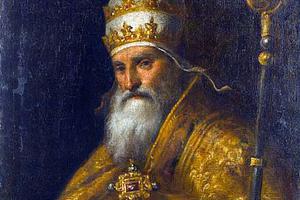St. Pius V: The Saint Who Transformed the Papacy Forever
This reforming pope, renowned for his sanctity, helped solidify the Council of Trent’s legacy and left a visible mark on the papacy itself.

Pope St. Pius V (1504-1572) was born in Italy to a humble family. From a young age, he was formed and well educated by the Dominicans. He entered the order and was ordained a priest at the age of 24. He then taught philosophy and theology for more than 15 years.
Throughout his time as a priest, professor, and later bishop, he was known for the time he spent in prayer, his commitment to fasting and his zeal for the truth. When he was elected pope, Pius was tasked with implementing the reforms and decrees of the Council of Trent. The council ended in 1563 and he became pope in 1566.
His main desire was to bring about a deep renewal in the life of the Church that was built upon a more radical conversion to the heart of Christ. This meant that the Church needed to be clear about its teachings, unwavering in its prayer, and intentional with its treatment of the poor. For this reason, Pius often gave alms to the poor rather than hold the customary papal banquets.
Pius also kept the Dominican habit as pope, which gave birth to the custom of the pope wearing the white simar (cassock with shoulder cape) even to this day. It was his preparation as a Dominican, and as a disciple motivated toward ongoing conversion, that enabled him to be the pope that the Catholic Church needed.
Pius once said, “You are the salt of the earth! You are the light of the world! See to it that the people are edified by your example, by the purity of your lives, by the moderation of your conduct, and the brilliance of your holiness. God does not ask of you mere ordinary virtue. He demands downright perfection.”
Pius knew that we do not perform righteous deeds to gain the attention of others. Rather, loving others is the result of experiencing the abundant love of God for us. This often led Pius to spend time at the bedside of those who were sick in the hospital. He would never waver from encountering lepers and would wash the feet of the poorest of the poor.
Serving those who were most in need came from his desire to love others as Christ loved us. It also arose from his willingness to partake in the sufferings of others. The pope was known to say, “O Lord, increase my sufferings and my patience.” He saw that there are no circumstances or challenges that God cannot be found in. This does not mean that God gives us hardships to teach us a lesson but that he carries his cross while we journey with ours.
The English word “patience” is derived from the Latin word patientia, which can also be translated as, “to suffer.” When we suffer we are waiting. We must rely on the presence of God and on his ability to conquer all things. There is a close connection, as Pope Pius V knew, between suffering and patience. Our willingness to enter into patient suffering can make us more like Jesus.
For this reason, Pius said, “All the evils of the world are due to lukewarm Catholics.” His radical but intentional focus on making Christ the center of his life meant that he wanted to love others the way that Jesus did. However, it also convinced him (during a time in the Church when renewal was desperately needed) that disciples must make God their absolute.
Such a choice brings true freedom because it empowers us to allow Christ to act through us. Whether we are pope or not, that is the calling of every Catholic.
- Keywords:
- pope pius v
- st. pius v
- popes
- saints
















